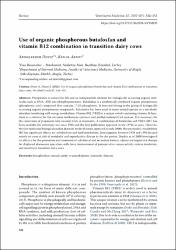Use of organic phosphorous butafosfan and vitamin B12 combination in transition dairy cows
Künye
Deniz A, Aksoy K (2022): Use of organic phosphorous butafosfan and vitamin B12 combination in transition dairy cows. Vet Med-Czech 67, 334–353.Özet
Phosphorus is critical for life and an indispensable element for biologically occurring organic mol-ecules such as DNA, ATP, and phosphoproteomes. Butafosfan is a synthetically produced organic phosphorous (phosphonic acid) compound that contains 17.3% phosphorus. It does not belong to the group of biologically occurring organic phosphorous compounds. Butafosfan has been used in many animal species as a metabolic stimulant interfering with energy metabolism. Vitamin B12 (VB12) is a unique cobalt-cont aining vitamin. It func-tions as a cofactor for the enzymes methionine synthase and methyl-malonyl-CoA mutase. It is necessary for the conversion of propionate into succinyl-CoA in ruminants. A combination of butafosfan and VB12 (iBC) has been available for veterinary use since 1958 and the first publication appeared in the 1970s in cows. However, the first molecular biological studies about its mode of action appeared in early 2000s. Recent studies revealed that iBC has significant effects on carbohydrate and lipid metabolism. Investigations between 1970 and 1994 focused mainly on cows at risk of metabolic and reproductive disease in the dry period. Studies as of 2000 investigated its efficacy for the prevention and treatment of subclinical and secondary ketosis, adjunctive/supportive therapy for displaced abomasum operation, milk fever, improvement of postoperative rumen activity, uterus involution, and mastitis in transition dairy cows.


















